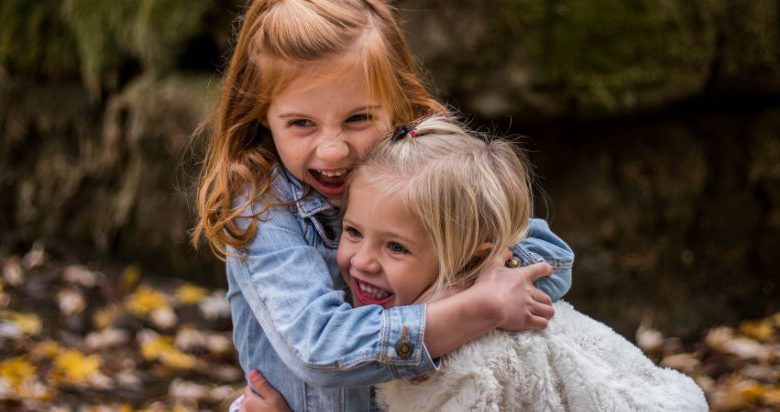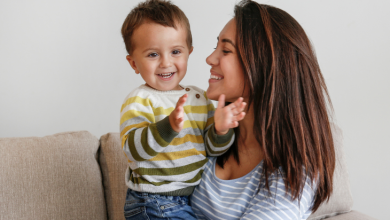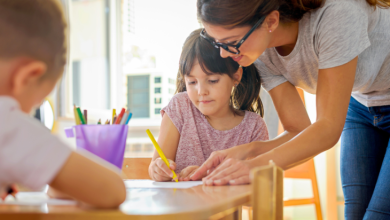Nurturing Social Skills In Preschoolers: Developing Friendships and Cooperation

Nurturing Social Skills In Preschoolers: Developing Friendships and Cooperation
Whether your preschooler is headed back to school as a seasoned professional or off to school for the first time, you may be experiencing as many jitters as they are. Parents often worry about their kiddos making friends or feeling included among their peers. If this feels familiar, you are not alone! While there are many challenges your child will face as they grow, learning how to develop friendships is something you can nurture and help grow throughout their lives. Throughout this post, we will discuss the stages of friendship and play development along with strategies to help build those skills and a peek into the crucial role preschool teachers play in their young lives.
The Stages Of Friendship In Preschoolers
Developmentally, children don’t start to actually “play together” until around three or four years old. Until they reach that point, they often engage in what is called parallel play, where they play alongside each other without significant interaction. This social stage is important because it helps them become comfortable in the presence of others and allows them the opportunity to observe social cues.
As preschoolers grow older, they start learning about sharing and taking turns. Teachers at schools such as Little Sunshine’s Playhouse and Preschool and parents can encourage this behavior by providing opportunities for cooperative play and guiding children in sharing toys or taking turns in activities. During this time, preschoolers will gradually develop their social skills by interacting with their peers, where they learn to initiate conversations, make eye contact, use appropriate greetings, and respond to others’ cues. By engaging kids in social interactions such as playdates, preschool, or community activities, parents and loved ones can help kids feel more comfortable in social settings as they set out into the world.
As your preschooler grows, you may see them progress into the ability to initiate conversations, make eye contact, use appropriate greetings, and respond to others’ cues. Have your camera ready to capture some precious moments where they greet their best buddy with a big bear hug!
Eventually, you will start to see signs of your child beginning to understand their friend’s feelings and show empathy. There are some great opportunities during this stage for teachers, parents, and loved ones to have conversations about how to respond to their friends’ feelings and how to react appropriately. Introducing problem-solving skills, engaging in group activities, and having fun in pretend play allows preschoolers to explore social roles, develop their imagination, and practice their social skills, all while having fun!
Remember, adults play a crucial role in modeling positive friendship skills. By demonstrating kindness, empathy, and good communication in your interactions with others, you will provide guidance and support when conflicts arise and help your preschooler understand not only social cues but the importance of apologizing and forgiving.
Raising Kind Kids
While worrying about your child being included amongst their peers is one thing, the fear that your child will not be kind may trump it! Raising kind kids is a goal that many parents strive for and yet may struggle with knowing where to start.
Here are some strategies and tips to help you foster kindness in your children:
- Be a Role Model: First things first, children learn by observing their parents and caregivers. Modeling kindness in your daily interactions, both within the family and with others outside, showing empathy, helping others, and engaging in acts of kindness are great ways to teach your kids without even having a conversation! Children are more likely to emulate the behavior they see every day, so don’t think that your intentions go unnoticed!
- Teach Empathy: We know that empathy is the ability to understand and share the feelings of others. Encouraging your children to put themselves in someone else’s shoes and consider how they would feel in a particular situation will help them to see the other side of the situation, where they may not have known there was another side to begin with. Talk about emotions and discuss how their actions impact others. Their answers may surprise you!
- Practice Gratitude: Help your children develop a sense of gratitude by encouraging them to appreciate the kindness they receive from others. Teach them to say “thank you” and express appreciation for acts of kindness, big or small.
- Encourage Acts of Kindness: Foster a culture of kindness in your family by encouraging your children to perform acts of kindness. This can include helping a sibling with a task, sharing toys, or offering a kind word to a friend. Recognize and celebrate their acts of kindness to reinforce the behavior while also teaching them that they are not to do these kind acts with the expectation of something in return. This can be a particularly hard lesson to teach at such a young age, but so worthwhile.
- Teach Respect and Inclusion: Teach your children to respect others’ differences, such as cultural, racial, or religious diversity. Encourage inclusive behaviors by emphasizing the value of all individuals and promoting friendship and acceptance among peers. Enrolling your child in a preschool like Little Sunshine’s Playhouse and Preschool is a great way to involve your preschooler in an environment outside the home where they are exposed to different peers outside the family.
- Inspire Kindness Towards Themselves: This is probably the most important point of this whole post. Kindness starts from within. Teaching your children to be kind to themselves by promoting self-care, positive self-talk, and self-acceptance will help them develop resilience and a healthy sense of self-worth.
Parents, it is important to remember that raising kind kids is an ongoing process that requires patience, consistency, and reinforcement. By incorporating these strategies into your daily interactions and nurturing a compassionate environment, you can help your children develop into kind and caring individuals.
The Essential Role of Preschool Teachers in Developing Social Skills
Preschool teachers play a vital role in these formative years of children’s lives. They are often the first new environment with new faces that kiddos get to experience outside of the home or homes of close friends and families. By working with children every day they are able to aid in the development of social skills and create a positive learning environment.
Preschool teachers have the remarkable ability to create a nurturing and inclusive environment that encourages social growth. By setting the tone for kindness, empathy, and respect, they provide a safe space for children to explore and develop their social skills. Through daily interactions and intentional classroom activities, they model positive behaviors and create opportunities for children to practice communication, sharing, and cooperation.
When you enroll your child in a preschool such as Little Sunshine’s Playhouse and Preschool, you get to trust preschool teachers to serve as facilitators, guiding your children in navigating social interactions effectively. They create structured activities that promote collaboration, teamwork, and problem-solving. Whether it’s a cooperative game or a group project, they boost children to work together, communicate their ideas, and listen to their peers. These experiences lay the foundation for building friendships, resolving conflicts, and developing strong interpersonal skills.
By understanding the importance of empathy and emotional intelligence in fostering healthy relationships, preschool teachers teach children to recognize and understand their own emotions, as well as those of their peers. Oftentimes they incorporate activities that encourage perspective-taking, discussions about feelings, and role-playing scenarios, they help children develop empathy and an understanding of the impact their words and actions have on others.
Preschool is a time when children are exposed to a diverse range of backgrounds, cultures, and experiences. Preschool teachers at Little Sunshine’s Playhouse and Preschool celebrate this diversity and actively promote inclusion. They create opportunities for children to learn about different traditions, languages, and customs. By fostering an inclusive environment, they encourage children to appreciate differences and develop respect for all individuals.
Preschool teachers are not merely educators but also champions of social development. They recognize the importance of creating a nurturing environment, facilitating social interactions, and fostering empathy, inclusion, and social confidence. Through their guidance and dedication, they help children develop the social skills necessary for building healthy relationships and navigating the complexities of the world. Preschool teachers have the incredible opportunity to shape the social landscape of our little learners and set them on a path toward positive and fulfilling social interactions for years to come.
Our Hope For You And Your Children
We hope this post has shed some light on the stages of friendship in preschoolers and what to expect as they grow. Following some simple guidelines, you should see your kiddo grow into kind and respectful people who make this world a better place. We hope that the preschool you choose for your child offers the perfect environment for them to learn and thrive in as they grow into their social skills!





